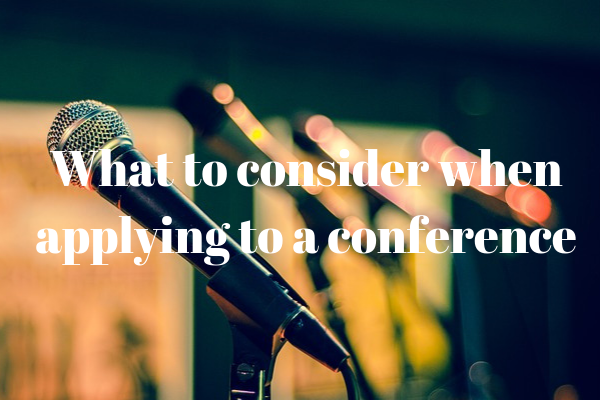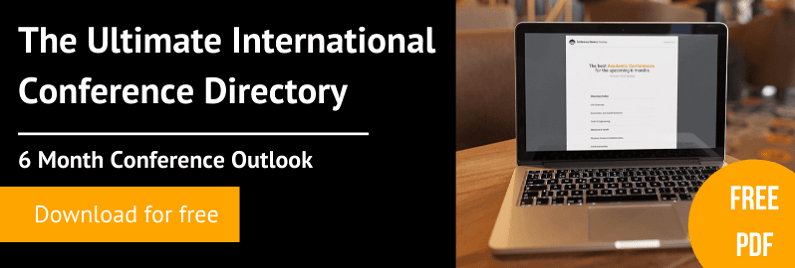
How to Get Accepted to an Academic Conference
Read a summary using the INOMICS AI tool
Everyone knows that it's important for the development of your research to attend conferences, and, if you are feeling up to it, to also present your work. Presenting at a conference, scary as it can be, allows other people in your field to comment on your work, often prompting discussion that can help you review your research's weaker parts while crystallising its stronger aspects. Not only that but with the right networking, it can really give your career a boost too - you never know who you may hit it off with. But first things first, how can you get your work accepted to a conference? Well, here are some tips on applying to conferences to give you the best chance of success. Read and take note!
Download the Conference Monkey Directory - 6 Month Conference List

Pick the right conference for your personality and your research
It sounds simple and yet is really worth remembering: the best way to get your work accepted is to target it to an appropriate conference. Conferences can be large or small, very specialist or more broad, and based on a single subject or more interdisciplinary. Which conference will suit you best depends on a number of factors, including both your personality and the subject of your research. In terms of personal factors, some people are more comfortable in a smaller conference with between fifty and a hundred attendees, where can you get to know everyone there reasonably well. Other people, perhaps those nearer the extrovert end of the spectrum, may prefer a busier, more bustling environment that you might get from a very large conference that offers thousands of presentations on an array of topics. In terms of your research, think about whether your work would be interesting to and informed by a wide range of subjects and fields, in which case you would want to attend a broad interdisciplinary conference, or whether it is more niche and would fit better at a specialist conference.
Another factor in picking your conference should be whether it is local or international. Given there often greater funding, big international conferences usually have the best reputations, and so presenting at them is more highly regarded - definitely something for the CV! That said, it can be easier to get your work accepted to a smaller national conference, and you might be more comfortable presenting at a lower-pressure event if this is your first time. You can also begin small and build up to the bigger conferences as your confidence grows! Also important is funding - how will you pay for your travel and accommodation costs? Find out what budget is available to you from your university, as you might find that you can get funding to attend a cheaper national conference but not an expensive international conference. Sometimes it is also worth checking outside of your university, as the occasional independent institution will also offer funding. This, of course, will require a bit of research but could really be worth your while.
Look out for a Call for Abstracts
To know when conferences are going to be held, keep an eye on relevant websites and sign up to email newsletters. A good place to start would be asking at your own faculty, as your professors will be familiar with annual conferences in the field and can point you in the right direction. When a conference is ready to accept applications for presentations, they will put out a “Call for Abstracts” in which they invite researchers to submit a brief summary of the work they would like to present. A Call for Abstracts usually includes information on the themes of the conference, and what topics they are especially interested in. If you can find a way to make your work fit into one of the conference themes, you will improve your chances of your abstract being accepted. Keep your finger on the pulse to ensure that you don't miss any deadlines - tardiness tends not to be appreciated!
Tips on submitting your abstract
If you've identified the conference which is right for you and they've put out their Call for Abstracts, then you just need to write an abstract of a few hundred words describing what work you can present. Remember that an abstract proposing to present experimental results is usually more likely to be accepted than one presenting theoretical work. Even if your experiment isn't complete or your data analysis isn't finalised, you can still present preliminary results of what you have so far. Also remember that research which is innovative, new, or unusual is more likely to be accepted than work which is a re-tread of well-known research in your field. This may sound obvious, yet it is actually where lots of people fall down. Better to be a bit too ambitious, than overly cautious!
When you submit an abstract for consideration, you'll probably be given the option to apply for either a talk or a poster presentation, or both. Talks are generally considered to be more prestigious than poster presentations, so it's worth applying to give a talk even if you feel nervous about the prospect. The usual strategy is to indicate that you would like to apply for both a talk and a poster presentation, and hope that you get lucky and land a talk. Even if your first application is not accepted don't be too downcast, just applying for a conference should be considered an achievement - it is a process that, in reality, few put themselves through. More importantly, conferences in academia are proliferating, so there will no doubt be another one quickly visible on the horizon for you to channel your energies towards. Good luck!
Download the Conference Monkey Directory - 6 Month Conference List
Top Blog Posts to Read:
What's the difference between a conference, a seminar, a workshop and a symposium?
8 Benefits of Attending Conferences
What Should Women Wear to Academic Conferences?
What Should Men Wear To Academic Conferences?
A Guide to Asking Good Questions at Conferences
How To Improve Your Public Speaking











